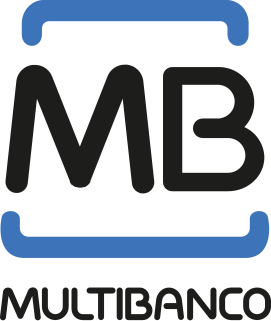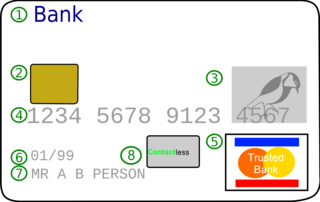A debit card is a payment card that can be used in place of cash to make purchases. It is similar to a credit card, but unlike a credit card, the money for the purchase must be in the cardholder's bank account at the time of a purchase and is immediately transferred directly from that account to the merchant's account to pay for the purchase.

Electronic funds transfer at point of sale is an electronic payment system involving electronic funds transfers based on the use of payment cards, such as debit or credit cards, at payment terminals located at points of sale. EFTPOS technology was developed during the 1980s. In Australia and New Zealand, it is also the brand name of a specific system used for such payments; these systems are mainly country-specific and do not interconnect. In Singapore, it is known as NETS.

Mastercard Maestro is a brand of debit cards and prepaid cards owned by Mastercard that was introduced in 1991. Maestro debit cards are obtained from associate banks and are linked to the cardholder's savings account, current account or any of several other types of accounts, while prepaid cards do not require a bank account to operate. Maestro cards can be used at point of sale (POS) and ATMs. Payments are made by swiping cards through the payment terminal, insertion into a chip and PIN device or by a contactless reader. The payment is authorized by the card issuer to ensure that the cardholder has sufficient funds in their account to make the purchase. The cardholder then confirms the payment by either signing the sales receipt or entering their 4- to 6-digit PIN, except with contactless transactions below a specified amount for which no further verification is required.

Visa Electron is a debit card product that uses the Visa payment system. It is offered by issuing banks in every country with the exception of Canada, Australia, Argentina, Ireland and the United States. The difference between Visa Electron and Visa Debit, a similar product, is that payments with Visa Electron require that all the funds be available at the time of transfer, i.e., Visa Electron card accounts may not normally be overdrawn. Visa Debit cards, on the other hand, typically allow transfers exceeding available funds up to a certain limit. For that reason, Visa Electron cards are more commonly issued to younger customers or customers that have poor credit. Some online stores and all offline terminals do not support Visa Electron because their systems cannot check for the availability of funds. In addition to point of sale debit payments, the card also allows the holder to withdraw cash from automated teller machines (ATMs) using the Plus interbank network.

The Express Payment System, more commonly known as the EPS, was the EFTPOS system originally of the ATM cards of Bank of the Philippine Islands and its subsidiaries, BPI Family Savings Bank and BPI Direct Savings Bank. Today, it is the EFTPOS system of the Expressnet interbank network in the Philippines. The system is the most popular EFTPOS system for ATM cardholders in the Philippines and is accepted nationwide. Rivals of the network include MegaLink's PayLink and the similarly named BancNet Payment System (BPS).

Payment cards are part of a payment system issued by financial institutions, such as a bank, to a customer that enables its owner to access the funds in the customer's designated bank accounts, or through a credit account and make payments by electronic acc transfer and access automated teller machines (ATMs). Such cards are known by a variety of names including bank cards, ATM cards, client cards, key cards or cash cards.
An interbank network, also known as an ATM consortium or ATM network, is a computer network that enables ATM cards issued by a financial institution that is a member of the network to be used to perform ATM transactions through ATMs that belong to another member of the network.

Network for Electronic Transfers or more commonly known as NETS; is a Singaporean electronic payment service provider founded in 1985 by a consortium of local banks to establish the debit network and drive the adoption of electronic payments in Singapore. It is owned by DBS Bank, OCBC Bank and United Overseas Bank (UOB).
ATM usage fees are the fees that many banks and interbank networks charge for the use of their automated teller machines (ATMs). In some cases, these fees are assessed solely for non-members of the bank; in other cases, they apply to all users.

Multibanco is a portuguese interbank network. Is the largest interbank network in Portugal owned and operated by SIBS, that links the ATMs of 27 banks in Portugal, totaling 12,700 machines as of December 2014. The bank members of Multibanco control the SIBS. Multibanco is a fully integrated interbank network. One of the most notable characteristics of Multibanco is the wide range of services that can be utilised through its machines.
The payment card industry (PCI) denotes the debit, credit, prepaid, e-purse, ATM, and POS cards and associated businesses.
The BancNet (BN) Point-Of-Sale System is a local PIN-based electronic funds transfer (EFTPOS) payments solution operated by BancNet on behalf of the member banks and China UnionPay (CUP). The BN point of sale (POS) System allows merchants to accept the automated teller machine (ATM) cards of any active BancNet member bank as payment for goods or services and obliges BN to settle the transaction as early as the following banking day through a direct deposit to a settlement account with any member bank. Acceptance of CUP cards is limited to SM Prime Holdings, Inc.'s Department Store, Supermarket, Hypermarket, Super Sale, Watson's, Sports Central, SM Appliance, Toy Kingdom, and select Surplus Stores.
Visa Buxx is a prepaid card available in the United States and intended for use by teenagers.

A credit card is a payment card issued to users (cardholders) to enable the cardholder to pay a merchant for goods and services based on the cardholder's accrued debt. The card issuer creates a revolving account and grants a line of credit to the cardholder, from which the cardholder can borrow money for payment to a merchant or as a cash advance. There are two credit card groups: consumer credit cards and business credit cards. Most cards are plastic, but some are metal cards, and a few gemstone-encrusted metal cards.

Rede known as Redecard is a Brazilian multi-brand acquirer with 25 brands in its portfolio, for credit, debit and benefit cards. Its activities include merchant acquiring, capturing, transmission, processing and settlement of credit and debit card transactions, prepayment of receivables to merchants, rental of POS terminals, check verification through POS terminals, credit card machine and the capture and transmission of transactions using benefit-voucher, private-label cards and loyalty programs such as Multiplus. The company is the first largest in its sector. The company was traded in BM&F Bovespa and disclosed in 2012, 24, September.

Cielo is the largest Brazilian credit and debit card operator. Cielo is the biggest payment system company in Latin America by revenue and market value.
RuPay(portmanteau of Rupee and Payment) is an Indian multinational financial services and payment service system, conceived and launched by the National Payments Corporation of India (NPCI) on 26 March 2012. It was created to fulfil the Reserve Bank of India's (RBI) vision of establishing a domestic, open and multilateral system of payments. RuPay facilitates electronic payment at all Indian banks and financial institutions. NPCI maintains ties with Discover Financial, JCB to enable RuPay card scheme to gain international acceptance.
The Empresa Interbancária de Serviços S.A. is the operator of the Angolan interbank network for the network of ATMs and Point-of-Sale (POS) terminals for automatic payments under the brand name of Multicaixa. EMIS is also the clearing house for those payments and for direct debit and funds transfer operations (Giro) for all banks in Angola.

SIA S.p.A. is an Italian company operating in the area of ICT, providing solutions and technologies to the banking and finance sector in addition to platforms for financial markets and e-payment services.

RecargaPay is a Brazilian fintech focused on essential services. Through an app, it provides an ecosystem of payments for customers. Founded in 2010 by Rodrigo Teijeiro (CEO), Alvaro Teijeiro (CTO), and Gustavo Victorica (COO), the company has over 300 employees based mainly in São Paulo, Buenos Aires, Argentina, and Miami, USA. Available in Brazil, RecargaPay's app attends to the needs of banked and unbanked people, simplifying basic everyday transactions, such as bill payments and boletos, cell phone and transportation cards recharges, gift cards, buying cooking gas, among many others.











